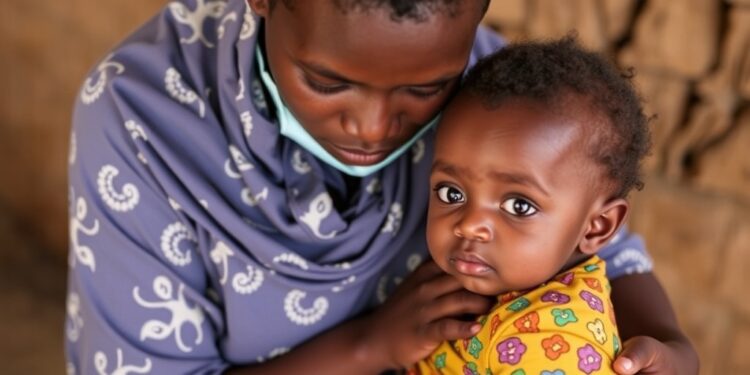
Researchers at the University of Maryland School of Medicine (UMSOM) have significantly advanced the field of global health with their recent findings on a new meningitis vaccine. This pivotal study, which is critical for public health in sub-Saharan Africa, demonstrates that a pentavalent meningitis vaccine can provide effective protection against multiple strains of the disease, namely serogroups A, C, W, X, and Y. The results highlight the vaccine’s safety and efficacy when administered to infants starting from the age of 9 months. With the alarming rates of meningitis in this region, where healthcare access is limited, such findings mark a turning point in the fight against this life-threatening infection.
The study not only showcases the vaccine’s ability to bolster immunity but also its compatibility with routine childhood immunizations. This compatibility is crucial, as it allows healthcare providers to administer the vaccine during standard check-ups without necessitating separate medical visits. The World Health Organization (WHO) took this substantial evidence into account and has recommended the Men5CV vaccine for inclusion in routine immunization programs across countries in the African meningitis belt. This proactive approach to vaccination represents a significant step forward in global health initiatives aimed at reducing children’s morbidity and mortality from meningitis.
The research findings were published in a recent issue of the reputable medical journal, Lancet, which underscores the study’s reliability and importance. A collaboration with renowned global health experts and institutions bolstered the research, enabling the investigation to be conducted in Mali, a key location where meningitis remains a public health crisis. The geographical area known as the African meningitis belt stretches through 26 countries, from Senegal to Ethiopia, where meningitis incidence rates are alarmingly high. Historical data indicate that death rates from this disease can exceed 15% due to the scarcity of healthcare resources, making effective vaccinations vital.
During the clinical trial that lasted six months in 2022, over 1,300 children participated, showing the broad interest and need for effective meningitis solutions. The children were randomized to receive either the pentavalent Men5CV vaccine or a comparator meningococcal vaccine that protects against only four strains. This meticulous approach ensured that researchers could accurately assess the pentavalent vaccine’s performance in a young demographic that is particularly vulnerable to severe outcomes.
The trial’s results were encouraging. The Men5CV vaccine not only met safety benchmarks but also induced robust immune responses. This outcome is paramount, as immunogenicity is as crucial as safety in vaccine development. Ensuring that a vaccine can reliably stimulate the immune system forms the foundation of effective vaccination campaigns, especially in high-risk regions. The ability of Men5CV to be stored at room temperature for up to 12 weeks adds another layer of appeal, particularly in resource-limited settings where refrigeration may not be consistently available.
In commenting on the study, Wilbur Chen, MD, emphasized the vaccine’s potential to significantly alleviate the burden of meningococcal disease. By providing a single-dose vaccination strategy in conjunction with other routine immunizations, healthcare practitioners could reduce the number of hospital visits and streamline children’s health services, catalyzing wider acceptance of immunization practices. Chen’s remarks point to a future where vaccine hesitancy may decrease as logistics surrounding vaccine administration become more manageable.
The significance of the failure to address viral and bacterial meningitis cannot be overstated; long-term complications from meningitis, such as brain damage and paralysis, are more prevalent in developing regions. The urgency of responding effectively to the frequent epidemics of this disease makes vaccine introduction not just a medical breakthrough but a moral imperative. The study thus is a critical step toward achieving broader health equity and ensuring that no child is left unprotected from preventable diseases.
PATH, an organization renowned for its contributions to global health initiatives, played an integral role in funding and guiding the study’s design. This partnership is emblematic of a collaborative approach needed to tackle global health challenges, particularly those compounded by socioeconomic factors. The association with the National Institute of Allergy and Infectious Diseases (NIAID) further emphasizes the research’s significance, as it combines academic rigor with practical public health imperatives.
The results from this study not only pave the way for new health policies that can enhance childhood immunization strategies but also set a benchmark for future vaccine research targeting other neglected diseases. The study’s findings hold potential for similar vaccine developments in areas plagued by infectious diseases, reflecting a growing momentum toward a more systematic approach to preventing such threats.
Additionally, the positive reception of Men5CV’s safety and effectiveness builds on previously successful interventions with meningitis vaccines, such as MenAfrivac, which has substantially reduced the prevalence of serogroup A in the African meningitis belt. This historical perspective fuels optimism for the new vaccine, drawing parallels between past and present successes in meningitis prevention.
In conclusion, the promising results of this study serve as a clarion call to prioritize vaccination in the African meningitis belt and other vulnerable regions. With the backing of robust international and local partnerships, we stand at the threshold of irreversibly changing the landscape of meningococcal disease prevalence. The introduction of Men5CV could herald a new era in global health, where childhood deaths from meningitis could be significantly reduced, saving countless lives and enhancing the quality of life for affected families and communities.
Subject of Research: People
Article Title: Safety and immunogenicity of a pentavalent meningococcal conjugate vaccine targeting serogroups A, C, W, Y, and X when co-administered with routine childhood vaccines at ages 9 months and 15 months in Mali: a single-centre, double-blind, randomised, controlled, phase 3, noninferiority trial
News Publication Date: 11-Mar-2025
Web References: WHO, UMSOM
References: Research data from UMSOM and PATH publications
Image Credits: University of Maryland School of Medicine
Keywords: Meningitis, Public Health, Infectious Diseases, Africa, Vaccination, Immunology, Children, Global Health.
Tags: global health initiatives in Africahealthcare access challenges in Africainfants vaccination in sub-Saharan AfricaMen5CV vaccine recommendationsmeningitis prevention strategiesmeningococcal vaccine safety and efficacypentavalent meningitis vaccinepublic health advancements in Africareducing childhood morbidity and mortalityroutine childhood immunizations compatibilityUniversity of Maryland School of Medicine researchWHO vaccination guidelines for Africa





